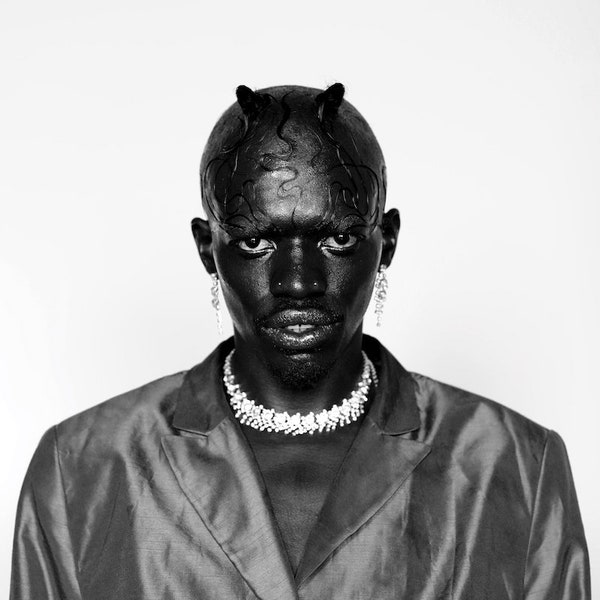Image by Zanele Muholi
It makes a ridiculous amount of sense that Desire Marea should tap prolific queer South African photographer Zanele Muholi to shoot the cover for their immaculate debut album, DESIRE. No one else could have captured the multifaceted visionary quite like Muholi. Marea is an artist who exists in the spaces in between. At the forefront of a generation of South African black queer creatives, Marea has found for themselves a distinct path that filters the outsider melancholy of Nkhane through edgier intersections with performance art, underground club culture and all-round bad assery. Marea’s work as part of the barrier breaking collective FAKA placed them in the role of countercultural innovator, becoming renowned for radial acts of performative intervention that unapologetically shifted space for the expression of queerness in the landscape of South African dance music. This tenacity would largely inform Marea’s solo work, culminating in DESIRE. Having just been released on vinyl via Mute Recordings for the first time, the album has once again been thrust into the cultural conversation. With time to ruminate on its exploration of divinity by way of trance inducing electronica, DESIRE has only grown in potency, making it one of the most remarkable debuts in recent memory.
The thesis statement of DESIRE is familiar; a focalisation of the nightclub as a sacred space, a church for the disenfranchised, the misfits, the club kids. But few records have so distinctly intertwined the spiritual with the hedonistic quite like DESIRE, somehow pinpointing the exact energy of finding your freedom on the dancefloor. In this sense, DESIRE is distinct from Marea’s work with FAKA. That sound is rooted mostly in the urban grime of gqom, whereas DESIRE finds itself occupied with the preternatural and transcendent potential of European rave, techno and euphoric house motifs. These motifs are entirely re-contextualised through experimental, multifaceted sound collages towards Marea’s own context. Modulating arp sounds, pounding four-on-the-floors and erratic breakbeat chaos is fused with familiar signifiers of South African dance music and operatic melodies that touch on the oral folk history of Marea’s Zulu heritage. The whistle sounds of Kwaito appear on the conjuring of Zibuyile Izimakade against rapid-fire rave synths, and the brass flourishes of South African jazz can be felt on the excellent Tavern Kween. On the latter, Marea takes on rapturous melodic techno by their own standards, delivering the sort of dance track that defies its own designation and defines DESIRE’s collage of socio-pop textures and musical influences.
To unpack the conceptual layers of DESIRE’s sonic pastiche is to begin an exploration into Marea themself. The album is the statement of an identity that finds itself in spaces of otherness, liminality and halfness; the femme and the masculine, the Eurocentric and the African, the club kid and the prodigal son. It is the synthesis of these disparate threads that formulate what for Marea is an identity defined by oft juxtaposing complexities. As such, Marea is intensely intimate and heartbreakingly honest on most of their lyrics. “Baby I love you, won’t you stay with me. It’s so lonely in this city” they confesses on You Think I’m Horny, a vexation on the loneliness of queer desire. Against barking vocal cuts, Marea asks simply that someone “squeeze me” as a reverse breakbeat thunders across the tumultuous isolation of gay hookup culture in the age of Grindr. “It’s me you drunk call” laments Marea on the slightly off-kilter and ominous Uncle Kenny. “Constant loss is testing my faith,” they continue as the track shifts through phrases of intimacy defined by delicate, twinkling synths and menacing ambience.
DESIRE’s second half shifts the tone from the ecstasy of the club towards more portentous pieces of sound art. Thokozani is a syncopated cacophony, continuing Tavern Kween’s jazz interpolations with a piano riff that chimes beneath the chaos, and The Void is a potent sonic summation of slipping into spaces of darkness. A take on viscous doomcore, Marea’s sinister chanting is morphed into a monstrous electronic growl, accented with distorted screams and juxtaposing moments of the delirious brightness of a harpsichord. DESIRE culminates with the violence of Studies In Black Trauma, whose terrifying disquiet recalls the recent investitures into the systemic demonisation of black identity by Moor Mother, told here by way of early Arca. The consuming ten minute opus continues the doom aesthetics of The Void, but this beast shifts from snarling, demonic doomcore to minimal gqom, ending aptly with the reassuring coo of Marea’s voice.
Marea’s performance across DESIRE is remarkable. Their voice is witchcraft, powerfully resonant in a way that carries the music’s inherent spiritualism. At times it becomes a potent siren call, lifting itself to the heavens to appeal to the higher powers that Marea invites to the dance floor. Self Centre serves as a rousing introduction and invocation of the spirits to Marea’s party, their voice becoming indistinguishable from a moaning organ and setting up a theatrical tonality which serves as a through line across DESIRE. The sheer brilliance of DESIRE cannot be overstated, this is music for the soul. The soul of a misunderstood brown club kid who found God in the sound of a synthesiser, to be exact. It’s a stunningly realised debut that turns the landscapes of its influences on their heads, finding a path that is entirely Marea’s own.
See the music video for Tavern Kween directed by Allison Swank below.
Follow Desire Marea
Facebook | Twitter | Instagram | SoundCloud




